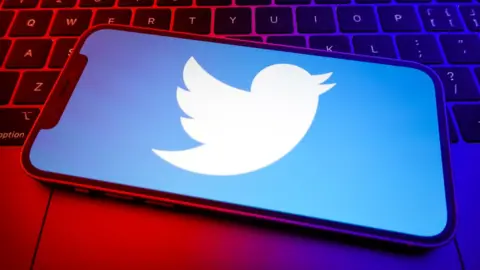Twitter drama continues with blue-tick confusion
 Getty Images
Getty ImagesTwitter halted its new $8 blue tick subscription offering on Friday in the latest head spinning reversal at the social media platform since billionaire Elon Musk bought the company.
The move came as a number of accounts impersonating big brands received the blue tick, previously a signal that the firm had verified the user as real.
In one instance, a user claiming to be drugs firm Eli Lilly said "insulin was free".
Twitter did not comment.
The incident added to the concerns about how Mr Musk's leadership was affecting the spread of misinformation on the platform.
"We apologize to those who have been served a misleading message from a fake Lilly account," Eli Lilly tweeted a few hours after the prank post went up on Thursday, reiterating the name of its real Twitter handle.
The firm's shares fell 4% on Friday amid the confusion.
US-based PR strategist Max Burns said he had seen fake accounts with the verified blue tick badge bought through Twitter Blue posing as support accounts for real airlines and asking customers who were trying to contact them on Twitter to direct message the fake accounts instead.
"How long until a prankster takes a real passenger's ticket information and cancels their flight? Or takes their credit card info and goes on a spending spree?" he said.
"It will only take one major incident for every airline to bail on Twitter as a source of customer engagement."
Mr Musk completed his $44bn purchase of Twitter late last month, and swiftly set about overhauling the company.
He has fired roughly 3,700 people - about half of the company's former staff - and pushed the firm to focus on finding ways other than advertising to make money.
His first email to employees warned: "The road ahead is arduous and will require intense work to succeed."
"Without significant subscription revenue, there is a good chance Twitter will not survive the upcoming economic downturn," he said.
Allow X content?
The firm's troubles as the digital ad market hits a downturn have been compounded as big brands and marketing firms halt spending on the platform amid concern about its direction.
The Twitter Blue subscription service asked users to pay £6.99 ($7.99) per month for a blue tick, a symbol that was previously free.
The move immediately raised concerns about fake accounts - the reason that Twitter had first introduced the system.
Lou Paskalis, president of marketing firm MMA Global, wrote on Twitter that Mr Musk needed to appoint a new chief executive and commit to stepping away from the company's operations.
"It's clear that leading Twitter is not among your many talents," he wrote.
Mr Musk had also said Twitter users engaging in impersonation without clearly specifying a "parody" account would be permanently suspended without a warning.
Several fake brand accounts, including those of Nintendo and BP, have been suspended.
Mr Musk's actions have prompted the departures of a rash of high-profile executives who had survived the staff cuts, including people in charge of protecting user data.
"I've made the hard decision to leave Twitter," tweeted chief security officer Lea Kissner.
The Federal Trade Commission on Thursday said it was watching events with "deep concern".
Yoel Roth, the site's head of trust and safety, also resigned just a day after staunchly defending Mr Musk's content moderation policy to advertisers.
Late on Thursday, Mr Roth's Twitter bio described him as "Former Head of Trust & Safety at @Twitter."
Mr Roth had became the public face of Twitter's content moderation after Mr Musk took over.
Mr Musk had praised him for defending Twitter's ongoing efforts to fight harmful misinformation and hate speech.

I've heard Twitter in its current state described as an aeroplane, mid-flight, without pilots.
The sudden departure of the head of trust and safety, the chief information security officer, and both the chief privacy and compliance officers is a dramatic development. It's not clear how soon they will be replaced, while the firm remains this unstable and sweeping job cuts have already been made.
From a security perspective, Twitter will, like all big platforms, be a constant target for hackers and bad actors around the world, meaning it cannot afford to take its eye off the ball and it must continue to ensure that its systems are robust, and threats are monitored.
As for users' privacy, you don't need me to tell you how important that is. And indeed, as we've seen, the US regulators are already keeping a very close eye on what's going on.
Elon Musk, on the other hand, says engagement and user numbers are higher than ever. We only have his word for it - I have to say that anecdotally I'm seeing plenty of Twitter Blue subscribers who seem happy with their new "blue tick". And however many of them there are, that's all fresh income that the firm did not previously have.
But it's also causing its own headache because now anybody can have a badge which until very recently was a symbol of authenticity - including fakes. And the confusion continues as this service appears to have been paused.
Musk has also said that bankruptcy is not out of the question. While it may feel like we are watching Twitter speeding towards the edge of a cliff, I think it's too early to tell whether it will manage to put the brakes on in time. In the early days of Facebook, Mark Zuckerberg's motto was "move fast and break things" - Elon Musk appears to have taken this to another level.

